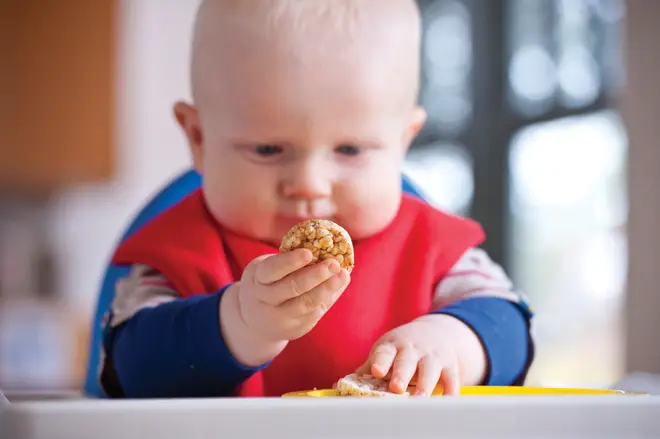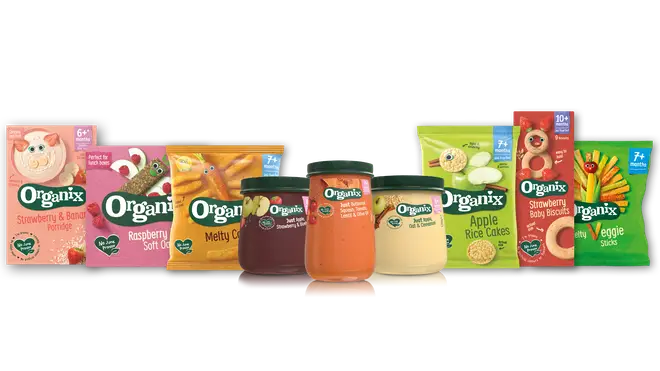Weaning experts share seven simple tips to get your baby eating solid food
23 June 2020, 13:20
 Promoted by Organix
Promoted by Organix

We reveal the best foods to offer babies, flavours to avoid, and how to tell when they're ready for more.
Introducing your little one to solid foods can be an exciting time for babies - but parents can understandably find it very stressful.
That's why we've asked the experts at Organix to share some of their top tips for introducing your child to new foods, textures and tastes in a pleasant and safe way.
When you're done reading the below tips, why not tune in to Toddler Trax on Global Player? It's packed full of all your Heart Feel Good favourites recorded with a kid-friendly twist!
Tip One - Establish Whether Your Baby is Ready Or Not
There are usually 3 signs that your baby is ready to move on and try solid food. But don’t worry if it takes your little learner longer it’s important to trust your instincts and tune into your little one as they’ll let you know when they are ready!

Can they:
· Coordinate their eyes, hands and mouth
· Can stay in a sitting position, holding their head steady
· Swallow food (rather than spit it back out)
If the answer is yes to all of these, then they’re likely ready to start !
Tip 2 - Introduce Solid Food Slowly at First
Solid food will feel strange at first. Starting slowly and simply with one small teaspoon of puree is a good start. Do this each day until your baby is looking for more. Try including our tasty jars or delicious finger foods.

Tip 3 - Introduce Vegetables First
Recent scientific research has shown that it's best to introduce vegetables as baby’s first tastes. It's best to start with one vegetable at a time, so that your baby’s precious palate gradually learns to distinguish between individual tastes.
Try them with carrot, sweet potato, parsnip, butternut squash or broccoli – these can work well either pureed, mashed or as soft cooked sticks. For first fruits you could try cooked apple or pear.

Don’t forget, you can also introduce Organix baby rice, mixed with baby's usual milk – whether its breast milk or formula .
Another convenient option are Organix Just Fruit and Veg Jars which are full of delicious fruit and veggie goodness, using only the best organic ingredients. They are the perfect first baby food for growing little ones who are beginning their weaning journey.
Tip 4 - Ensure a variety of foods
To ensure babies grow up accepting a wide range of flavours and different foods, it is important to give them lots of variety from the start.
As they grow, babies’ food habits become more fixed, as they identify the foods they do and don’t like, so getting them on the right track from the initial stages of weaning should help give them a healthy diet into adulthood.

Tip 5 - Avoid overly sweet or salted foods
It’s important that the flavours are not masked with salt or sweetened to make the savoury flavours more acceptable.
Not only can too much salt, free or added sugars, saturated fat and unnecessary ingredients distort the natural flavours of the food, they can also influence later eating habits. That’s why we at Organix are committed to our No Junk Promise which means there is no added salt and no artificial colours or flavours in our foods.
What’s more, our No Junk Promise is not just a stamp that you see on our foods but a guiding set of principles of what we will and won’t use when developing our foods.
Tip 6 - Know when they’ve had enough
You only need to offer tiny amounts to start with - just one or two teaspoons, just once a day will suffice, when your baby is completely awake, or perhaps when you feel properly relaxed.
Babies are generally aware when they’ve had enough and are good at indicating it, so if they start turning their head away or fuss when you offer more food, or even clamp their mouth shut, these are cues for you to respond to.
If your baby is following ‘baby-led weaning’ and self feeding, they might literally just stop picking up the next mouthful and you could get a sense that they’re ready to do something else.
Babies’ appetites vary a lot from day to day. So however frustrating it might be if they reject something you’ve put effort into making, tomorrow might be a completely different experience and they might even want to eat more than you expected! And don’t forget, for the first year your baby will be getting the majority of the nutrients and calories they need from breast milk or formula, so don’t worry if they aren’t taking in as much of the solids as you would like them to.

Tip 7 - Try not to worry
There’s a mountain of advice and methods out there. Whether you’re following baby led weaning over traditional spoon feeding methods, or a combination of the two, there is no right or wrong way.
The main thing is your baby eats a wide variety of food and learns to enjoy the start of a journey that will last the whole of their lives!
For further hints, tips and recipes visit Organix.com






















